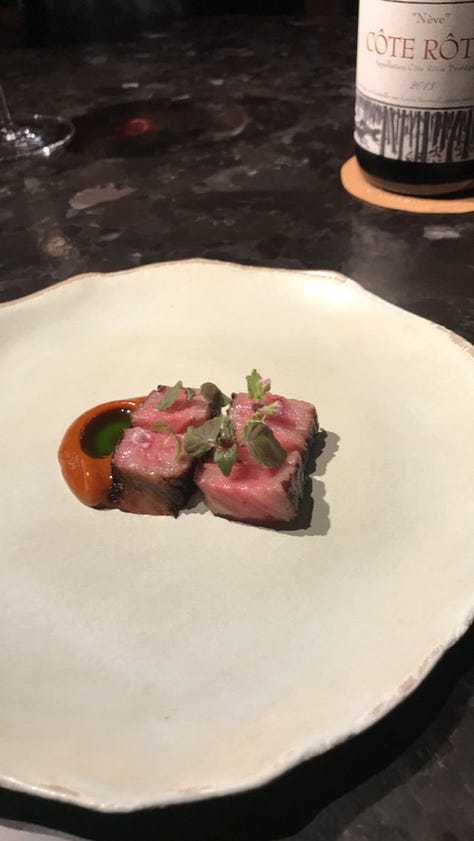Short Ribs I'd Like to Keep in My Mouth Forever
When I was younger I’d squirrel food in my cheeks. Mostly short ribs. I’d tuck it into the side pocket of my mouth and just... let it melt. Like a lozenge, like a secret, like a prayer I was too embarrassed to say out loud. Which sounds nonsensical unless you’ve ever tasted something so good you wanted to hold onto it, to keep it close just a little longer.
It began on the annual trip to visit our dead. The drive was always smooth, about an hour and a half outside of Seoul. I’d know we were close when the sign came into view—영락동산 (Yeongrak Dongsan)—marking the entrance to the cemetery. The grounds were well-kept: gravel paths, neatly trimmed grass, and rows of headstones stretching across gentle hills. My mom’s parents led the annual pilgrimage, a ritual that blended reverence and routine. Upon arrival, we’d begin by cutting the overgrown grass and clearing away fallen branches and debris that had accumulated over the year. It was a collective effort, each of us contributing to tidying the resting places of our ancestors. Once the grounds were cleared, we’d gather around the grave holding hands, as my grandmother led us in a short worship before the picnic mat was ever unrolled.
My grandmother was devout. She was the kind of woman who prayed with her whole body. Eyes clenched shut, hands tight in her lap, voice unwavering. Meanwhile, my aunt and I were barely going through the motions. At some point during the prayer, my aunt would nudge me, and I’d crack one eye open, only to meet my grandmother’s stern gaze mid-prayer. She always knew.
After the prayers, we’d gather on the silver mat to share 도시락 (doshirak), a lunchbox meticulously packed. The meal felt like an extension of the ritual, blending sustenance with remembrance.
But the real moment came after. On the ride home we’d stop for galbi, not just any galbi but 숯불갈비, the kind that came glistening off charcoal flame. Sitting cross-legged under the thatched bamboo ceiling, as the smell of sweet smoke and pear drifted through the gentle summer breeze, I’d inhale deeply, eyes fixed on the grill, and ask, “Is it ready yet?” The ribs were tender with zigzag knife cuts, the meat’s interior almost weeping with flavor. Where my grandmother bowed her head in worship, I gave that same solemn devotion to each bite of galbi. And then: one piece tucked into the cheek. Just one. I’d hold it long past when the fibers stopped making structural sense. An hour. Sometimes longer. It was a personal game of how long can I keep this holy object in my mouth?
Nobody told me it was gross. Because I told no one.
Was I unwell? Perhaps. But it wasn’t trauma, or some scarcity-mindset pathology, at least I don’t think so. It was reverence. It was a squirrel’s theology. The act of preserving something glorious not in Tupperware or in memory but in cheek and gum and tooth.
I no longer do this. Mostly out of shame. Or adult self-awareness. The way we outgrow imaginary friends or sucking thumbs.
But if I still did this, if etiquette and digestion and dignity weren’t constraints, I’d do it again here:



Atomix, where I woke up just in time for the galbi, where Ellia was visibly concerned about my blackout nap, and Andrew, charmingly tipsy, offered to narrate the wine pairing I missed. The dish arrived: lacquered pink squares, little rice balls, and perilla leaves folded like edible origami.
Jua, where the occasion was a faux-vasectomy celebration (don’t ask), but the Galbi & Chan was anything but a joke. The galbi arrived seared and sliced into thin segments, still rosy in the center. It was accompanied by a ring of miniature banchan, each more sculptural than the last. Everything carefully spaced, every flavor intentional.
Quatorze, where boeuf bourguignon, slow-braised, glossy, fell apart before the fork even asked. It sat on a cloud of mashed potatoes, flanked by tender carrots and pearl onions that tasted like they’d been napping in red wine all afternoon.
Up Thai, where the bone-in Beef Short Rib Panang sat in a pool of sauce thick with coconut milk. A few delicate herbs and red chili threads rested on top—more garnish than necessity—because the real centerpiece was the meat: thick, braised, and practically collapsing from its own weight. It’s my regular takeout order, one I’ve had more from a tightly wrapped container than dining in, always arriving perfectly sealed so not a single drop of sauce goes to waste.
Mapo Korean BBQ, where charcoal arrives first, glowing red and crackling at the edges, then gets lowered into the sunken grill at my table. Within seconds the heat kicks up; the marinated short rib lands on the grate, a soft sizzle. I pick up my chopsticks and hover around the edges. I go in for the banchan as nonchalantly as possible while my eyes narrow in, inspecting the minimum doneness—quietly wondering, is it ready yet? I can smell the moment it’s done, when the marinade releases that thin curl of smoky sweetness. It’s probably the closest in both flavor and texture to the Korean galbi I grew up eating.
These are the places that make me want to revert. To squirrel, to gum, to hold. To let taste overstay its welcome.
Maybe this is all just a strange elegy for a younger self who had no shame in loving things too much. Maybe it’s a long-winded way of saying: I miss the galbi I used to store in my cheek, a secret I wasn’t ready to let go of.


so incredible, I shed a tear
Wow. The intro is so incredibly vivid I can see the neatly manicured cemetery and almost see the 갈비 mush!
Excellent piece